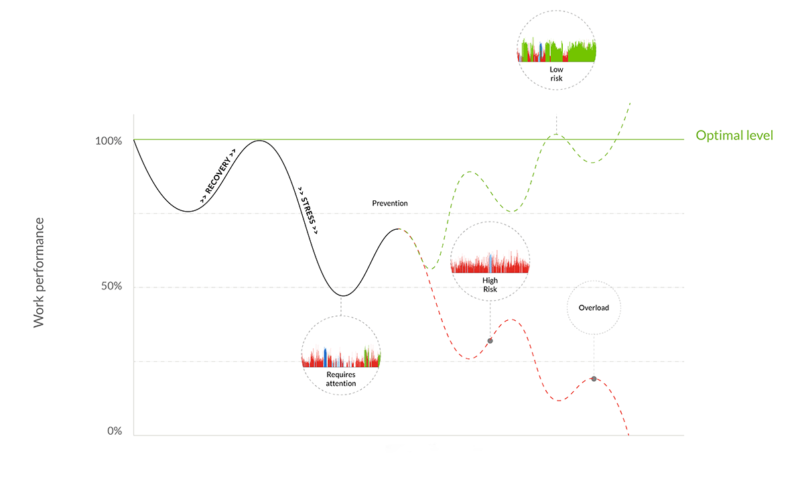
With the summer holiday season coming up, things are slowing down in many companies. This is a terrific opportunity to put emphasis on your employees’ professional development. Updating one’s skill set and ability is linked to better work performance and better well-being, making it an essential part of corporate wellness management.
A competent staff with good well-being can be the company’s most important asset. The skills and know-how the employees have, such as self-management and communication skills, have a major impact on their work performance and their well-being. When the employee has the skills needed to perform well in their job, they can also find it easier to manage their work-related stress. Having a sense of control is particularly important for one’s well-being and stress management.
The responsibility for taking care of professional development falls on both the employer and the employee. The employee can develop their professional skills by broadening their knowledge or updating their skill set to be able to perform better in their current role. The employee can also begin learning something entirely new, especially when aiming to move to a different role or take on a new work task.
It is then the employer’s responsibility to make sure that the employees have the time and means for professional development. Even though it might sound self-evident that the employer should make sure their employees have the right skill set and know-how to perform well in their job and develop themselves, not all employers monitor and invest in this as much as they should.
Having Sufficient Knowledge and Skills Supports Well-Being
The constant change in the modern workplace can lead to work tasks, roles, and areas of responsibility to change and reform at a fast pace. Unfortunately, the employees’ skills might not always automatically keep up with this change. If the employer does not actively offer chances for professional development, the employees can feel isolated.
Many employees may not even mention the issues they might be facing when their skills do not match their work tasks anymore, perhaps because they are afraid of how the employer will react. The employee can feel a sense of guilt or shame for not having the necessary knowledge for their current tasks.
This is unfortunately a straight road to presenteeism and loss of productivity. Presenteeism refers to a situation where a person is physically present, but mentally absent or otherwise unable to work as normal. For example, when one’s skills no longer match the requirements of their work tasks, it’s particularly challenging to perform well or find the work enjoyable or meaningful. If the employee doesn’t seek or receive help in this type of situation, the results will be poor performance, lack of productivity, and weakened motivation.

Picture: Employee’s performance and resources affect productivity. The earlier presenteeism and challenges are identified, the better the employer and employee can make the necessary changes to build better habits and prevent potential risks.
On the other hand, if the employer regularly invests and puts emphasis on professional development, making sure their employees have sufficient competence and skills, they can prevent presenteeism and many other corporate wellness issues. In addition, their employees will become more committed to the company.
If professional development has not yet been at the forefront of your company this year, it is now time to make it so. There are many ways for you as the employer to invest in professional development, but a good way to start is by having conversations with your employees and asking them to evaluate their own skills and knowledge related to their work tasks, as well as evaluating their interests for developing their skills further.
The atmosphere must be safe and supportive for there to be honest and constructive dialog. You can start by considering these following matters together with each individual employee:
- Are the work tasks and the employee’s skills and knowledge supporting their well-being?
- How content is the employee with their current work role and its requirements?
- Do the employee’s skills and knowledge match their current work tasks?
- Is there a need for further education or training?
- Evaluate together how the employee’s skills should be improved?
- Does the employee have some professional interests or an interest in career advancement?
Professional Development Can Also be Cost-Efficient
Supporting your employees’ professional development does not necessarily have to mean a major financial investment. It doesn’t always mean that the employer must pay for a new degree or offer the employees a chance to take part in an expensive seminar.
Nowadays there are many options available and professional development can be quite cost-efficient. So many materials can be found online, such as online seminars or lectures, courses, podcasts or books and articles. The employee can acquire these themselves, if they are given the time and are encouraged to do so.
Mentoring and sparring are also highly effective ways to learn and share information. If you haven’t tried them yet, give them a try! Mentoring is typically about the more experienced individual, for example the supervisor, mentoring the more inexperienced but willing to learn individual, for example the new employee. However, the process can work the other way around too. A great deal can be learned even when an experienced CEO sits down to be mentored by a new employee or someone with a different kind of expertise or vision.
Cross-functional projects within the company can also offer a great chance for professional development. These types of projects usually push people out of their comfort zone, which they say is where the most growth happens. Cross-functional projects are a fantastic opportunity to broaden one’s knowledge, learn better co-operation skills, and to learn more comprehensively about the company’s different operations.
Everyone Makes Mistakes – The Important Thing is to Learn From Them
A crucial factor in professional development is not being afraid or ashamed to make mistakes. The saying ”Learn from your mistakes’’ is popular for a reason. When we start learning something new or even just doing our everyday job which we are already qualified for, we sometimes make mistakes.
It is the employer’s responsibility to create an atmosphere and a culture where making mistakes is not the end of the world. Instead of judging we should ask ”What did we learn from this?’’. This type of open and safe organizational culture that supports learning also often reflects positively on the employees’ well-being.
Giving feedback is also one critical way to help your employees to learn and develop professionally. However, in many companies giving feedback is perhaps one of the biggest areas of improvement. Amidst all the hurry and rush, we might not stop to give proper feedback or even to check whether the processes for giving feedback are in order. The ability to both give and receive feedback should also be part of every employee’s skill set.
The most critical aspects of all of this are time and effort. The employer must genuinely offer their employees a chance to improve and learn more. This means dedicating some paid working hours for learning. Even though spending some of that precious working time on anything else than the necessary daily tasks can seem ineffective or risky, the time spent will pay itself back manifold in the future, both as good work performance and as increased well-being.
Firstbeat Life is a wellness solution designed to support employee health risk management and workplace health promotion. Reduce health costs and build a resilient workforce. For partners offers you a unique capability to succeed in the growing market for proactive health and well-being services. Learn more about Firstbeat Life.
If you liked this article, you should subscribe to our newsletter.
You might also be interested in

Firstbeat Life: How Do You Get Employees Engaged in Corporate Wellness?
When it comes to corporate wellness, one of the most common problems is getting employees engaged. So, what to do? Our specialist gives concrete tips, how to get employees commit to small changes.

How to Help Your Employees Manage Stress – Tools for the Employer and HR
The word “stress” often has a negative meaning. However, the truth is that without stress we would find it very hard to cope with our day to day lives. Stress…

What Does a Good Work-Life Balance Mean to You?
It’s a popular topic of discussion nowadays, but what does work-life balance really mean? Work-life balance is about how we use our time, resources, and energy between these two aspects…
